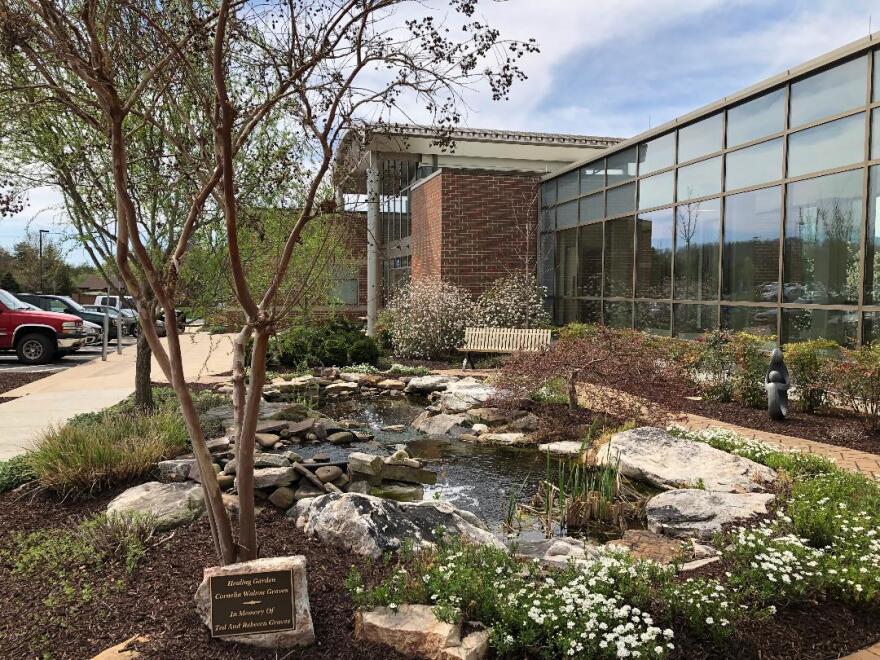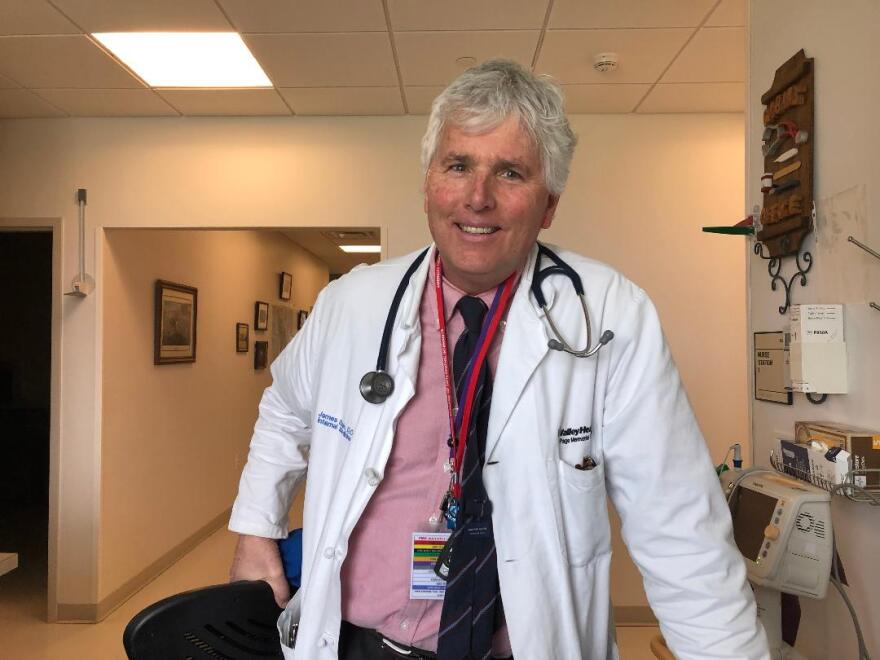More than half of Virginia’s rural hospitals are losing money, and two have closed since 2013 according to the Virginia Hospital and Healthcare Association. The challenge of operating medical centers outside of big cities is real. But despite those problems, communities are hoping to hold onto their hospitals.
When James Dale was practicing internal medicine in Philadelphia, his daily commute was about an hour, but in Luray, Virginia he and his wife could get a nice house less than a minute from Page Memorial Hospital. He’s chief of staff there, and most of the patients he sees are suffering from treatable conditions -- things like dehydration, pneumonia, urinary tract infections, older people with chronic illnesses.
That’s okay with Dale. He’s allowed, by law, to keep patients at this critical access hospital for no more than three days. If they’re not ready to go home by then or need complex medical or surgical treatment, he can send them to a more advanced hospital for continued care.
“We have a helicopter system for the really acute stuff and then ground transport for the other stuff,” he explains.
That’s not to diminish the importance of Page Memorial and other rural hospitals that treat people after car crashes or farm accidents, those who’ve suffered heart attacks or strokes. Without a medical center nearby, they might not survive.
“It would be dangerous to live here," Dale says. "It’s beautiful, but if you get really sick you need a place to get stabilized and get out of here fairly quickly, which we can do. These people getting into their car and driving over an hour to a hospital, a lot of them wouldn’t make it.”
But since he arrived in 1983, the hospital has faced a series of financial problems. Patients here tended to be older, sicker and more reliant on government programs than the statewide average according to Julian Walker with the Virginia Hospital and Healthcare Association.
“On average in Virginia, almost two-thirds – about 63% of inpatient admissions -- are going to be people who are Medicaid, Medicare insured. In some rural communities that number is upwards of 70%,” he says.
Neither Medicare, which serves seniors, nor Medicaid, which serves low income people and those with disabilities, paid the full cost of care, and thousands of people who had no insurance received free care at Page Memorial. Paying patients began leaving sooner according to Dr. Dale.
“The other hospitals started to get higher tech, and we started moving people sooner," he recalls. "It hit us hard in the late 1980’s. In fact, the hospital almost closed.”
That worried community leaders like Bill Dudley, a realtor who says Luray would be a tough sell without its hospital.
“I think people are very health conscious, and if there are not those kind of facilities quickly available, I think it’s certainly a negative for an area,” he contends.
And while Page County has just 23,000 residents, that number can double or triple in the summer when travelers flock to the area for scenery and adventures, and business people who depend on tourism are determined to keep the local hospital going.
“We have half a million people come through the Luray Caverns every year and another 1.5 million come to the Shenandoah National Park,” says Travis Clark, president of Page Memorial.
So the rural medical center did three things that have saved many hospitals here and nationwide. First, it merged with a larger group that operates a major medical center in Winchester and five smaller facilities in the area. Valley Health had the money to build a new 25-bed hospital that opened five years ago in Luray with an expanded emergency department and a rehabilitation center. It also promoted patient-friendly policies that made it easier for people to get care and won important changes in Richmond.
Part Two:
About a hundred rural hospitals have closed in this country since 2010 according to Kaiser Health News, but here in Virginia, many have done things to assure their survival in places that desperately need high quality emergency care and routine services.

Page Memorial Hospital in Luray has just 25 beds, but President Travis Clark says the facility plays a life-saving role for dozens of people each year.
"This is an agricultural area," he explains. "The patient could be in a farming accident. They come in. We get them stabilized in that precious hour and then get them flown out to a facility that can take care of them."
And Cathy Weaver, who directs human resources at Kontoor – a local maker of blue jeans -- says some people in rural parts of the Shenandoah Valley would not get specialty care if they had to travel far.
“If there’s a doctor or a specialist that comes to Luray, it’s a couple of hours away from work. If they have to travel to Harrisonburg, Winchester, Charlottesville, it’s a whole day away from work, and these are people who don’t get paid if they don’t work,” she says.
In addition, Page Memorial made changes that assure easier access for local people.
“They have their convenient care that’s open at night for folks who can’t get in during the day to see the doctors," Weaver says. "Their hours for testing are unbelievable. You can go on Sunday to have blood drawn!”
And the hospital provides transportation for patients according to Vice President Portia Brown.
“We don’t have buses. We don’t have Uber. We don’t have taxis, and so how do these people get to their healthcare? We offer that as a free service.”
That’s the kind of thing that has helped many rural hospitals to survive according to Julian Walker with Virginia’s Hospital and Healthcare Association.
“Hospitals have focused on efficiency, on belt-tightening, have also focused on improving the quality of care, the value of care.”
Rural medical centers have also begun to benefit from the expansion of Medicaid in Virginia. Page Memorial’s Chief of Staff, Dr. James Dale, says many people signed up soon after the General Assembly agreed.
“It’s 1,500 people in Page County – just in our county –have health insurance who did not have health insurance prior.”
About 17% of the hospital’s patients are now on Medicaid – a program that serves low-income families – and in July Page Memorial will have another reason to celebrate. The state has agreed to reimburse hospitals for the full cost of providing care – up from about 65% today.
Statewide, rural hospitals are hopeful. Virginia thought maybe 200,000 people would enroll in Medicaid when the program expanded. The actual number -- nearly 280,000, and having health insurance could mean less spending in the long-run. That’s because prompt treatment can keep medical problems from getting worse and costing more. Again, Dr. Dale.
“These are people who don’t go to the doctor. They only come when you really are sick now, and you’ve got to go to the hospital, and it could have been handled weeks ago if you just had had some insurance.”
Cathy Weaver, who helped raise $1.2 million for the new hospital, is as hopeful about its future as she was when her mother was admitted following a stroke. Specialists thought she would not survive, but when the patient was transferred to Page Memorial, the nurses knew better.
“The head nurse at the hospital told me when we went in, ‘She’s not ready to go yet. She’s not going anywhere,’" Weaver recalls. "By golly she was right!”
At first, her mom had difficulty swallowing. The doctor wanted her to have soup. The nurses complied.
“They were bringing in recipes that they had for different soups that the cafeteria would fix for her, and that’s the kind of care you get at a rural hospital!” Weaver says.
With a healthy diet and out-patient physical therapy, Weaver’s mother is alive and well five years later.



